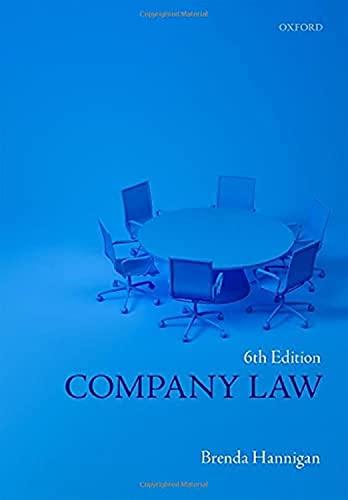Question
Steve and Clark are trading partners, managing a few businesses which included building yachts and farming, who after several years working together decide to take
Steve and Clark are trading partners, managing a few businesses which included building yachts and farming, who after several years working together decide to take a holiday to South Africa. They will be away for almost two months and as such, they ask their neighbor Ryan to look after the house and property whilst they are away. One week after their departure, a violent storm hits the place breaking a few windows of the house and some part of the roof exposing the house to the risk of further damage. The immediate expense is required to preserve the property, so Ryan engages a contractor to come and repair the windows and roof. During this time, Ryan tried to contact Steve and Clark but is unable to contact either of them as they are somewhere deep in the Amazon, so are not reachable.
When Steve and Clark return from the trip up the Amazon, they find that they have a large bill from the roofing contractor for repairs. They feel aggrieved at this situation and refused to pay for the repairs.
If the court decides that Ryan would be treated as an agent in the above situation, what percentage of the repair bill could he recover from Steve & Clark?
a.
100%
b.
0%
c.
50%
d.
75%
If Steve and Clark argue that they never authorised Ryan to arrange for any repairs and since they were not contacted to ask for repairs, they are not liable to pay for the repairs. Which of the following situations best explains their legal position w.r.t their argument?
a.
Ryan made a reasonable attempt to contact Steve and Clark, but it was impossible to contact them due to remoteness of their location, so Ryan is likely to succeed
b.
Steve and Clark are legally correct and so would not be held liable to pay for repairs
c.
All of the given options are possibly correct
d.
Ryan had no authority to arrange for repairs, so would be held liable to pay
Ryan believes that there was an emergency demanding immediate action and he acted for the best interest of Steve and Clark, so he should be treated as their agent and hence should not be legally liable to pay for the repairs. Which type of agency could be possible in the above situation, if any?
a.
Agency by Ratification
b.
Agency by Necessity
c.
There is no agency in this case
d.
Agency by Holding out
Assume that the damage caused to the house was minor and did not require immediate action but since the contractor was the relative of Ryan, Ryan hired the contractor for the repair work at a premium price. Which of the following statements would be considered by courts to decide the case?
a.
Repair was required sooner or later, so Ryan would still be treated as an agent
b.
Payment of premium price to contractor is not a relevant factor to decide the case
c.
There was no emergency, so no agency would be created by law
d.
Steve & Clark would still be liable to pay for repair in this case as they asked Ryan to take care of their property in their absence
Assume that Ryan did not disclose the actual owners of the house to the contractor when he arranged for repairs. Who can the contractor recover his money from?
a.
Ryan only, because Ryan was in legal possession of the house at the time of repairs
b.
Steve and Clark, as it is their house
c.
Ryan, as Ryan hired the contractor
d.
Either Ryan or Steve & Clark, based on the legal rule of undisclosed principal
Step by Step Solution
There are 3 Steps involved in it
Step: 1

Get Instant Access to Expert-Tailored Solutions
See step-by-step solutions with expert insights and AI powered tools for academic success
Step: 2

Step: 3

Ace Your Homework with AI
Get the answers you need in no time with our AI-driven, step-by-step assistance
Get Started


